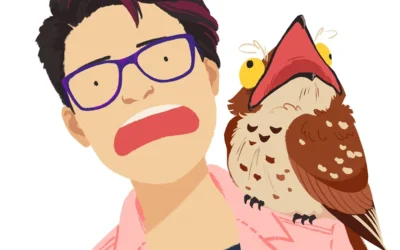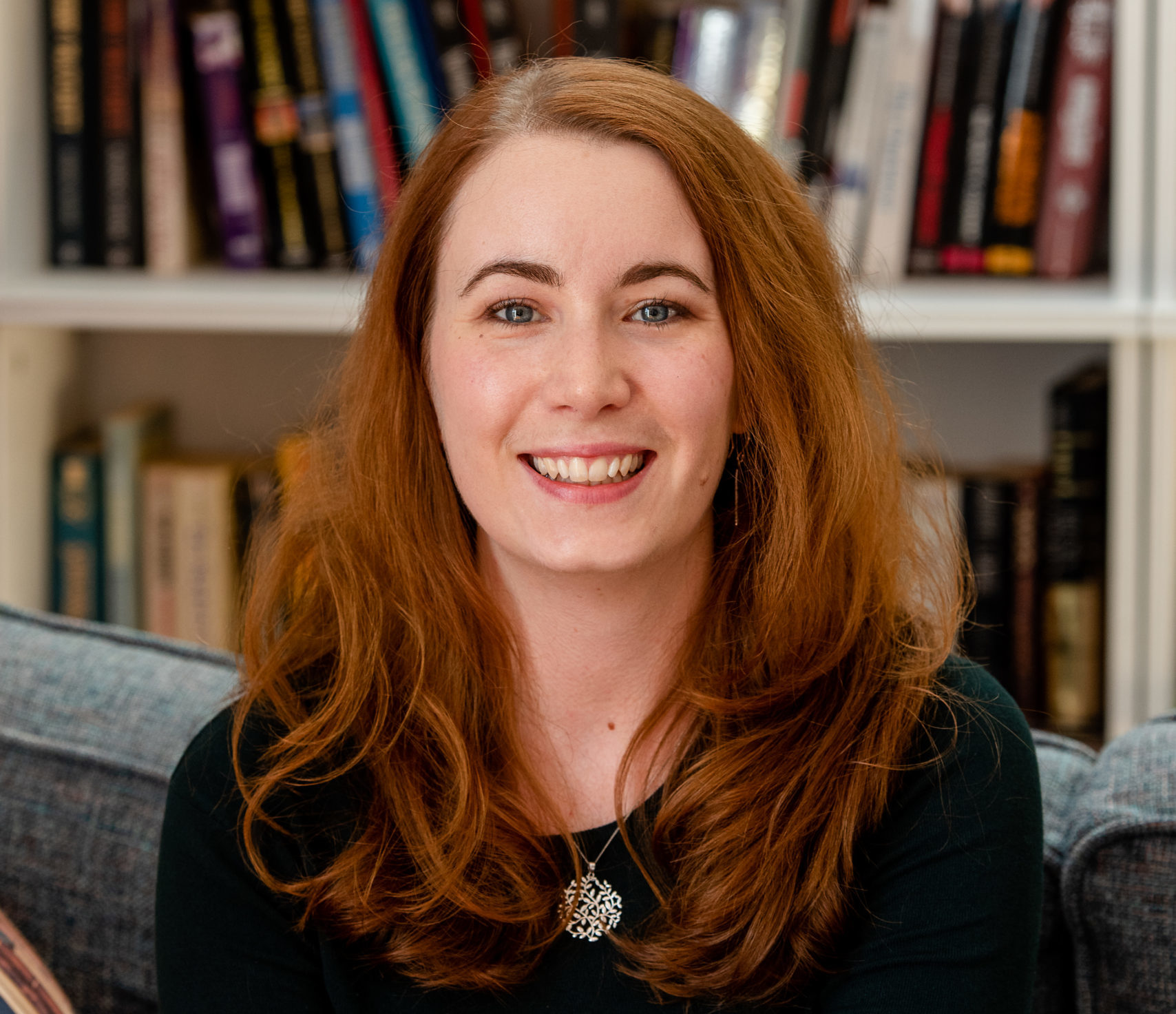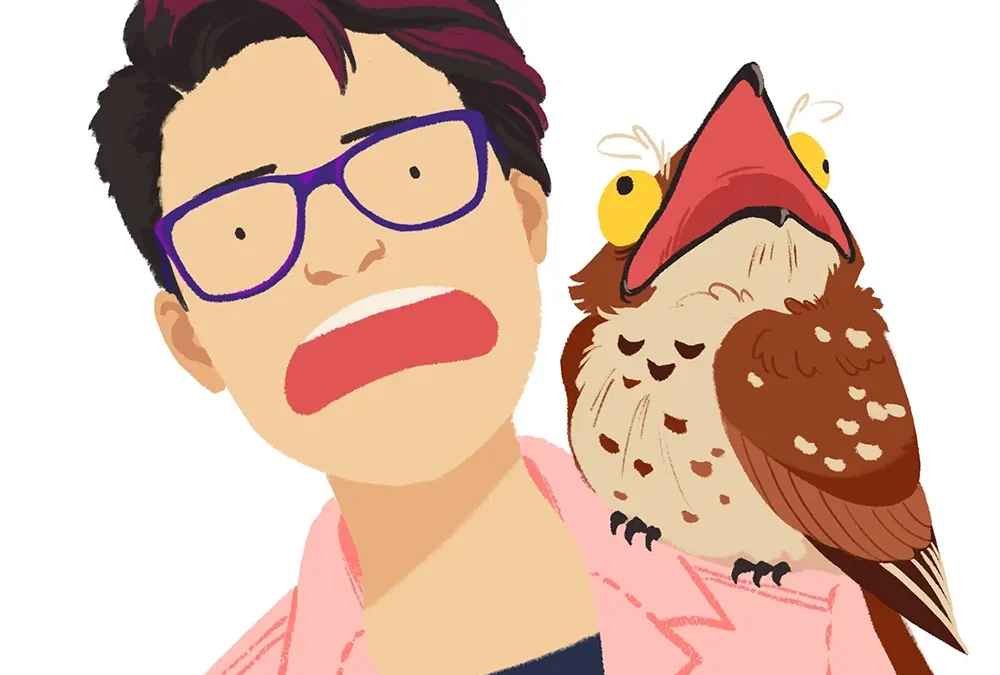Caitlin Rozakis is the pen name of Rebecca Rozakis. After graduating from Princeton, she has had too many career changes, including mechanical engineering (cut short after the murderous robot incident), finance (amortizing tequila receivables is not as fun as drinking tequila), and the American Museum of Natural History (who knew emus had birth certificates?), and a number of marketing positions, some at companies you may have even heard of. She lives in Jersey City with her husband and son.
I had the opportunity to interview Caitlin, which you can read below.
First of all, welcome to Geeks OUT! Could you tell us a little about yourself?
Thanks so much! The Grimoire Grammar School Parent Teacher Association is my second book; my debut last year was Dreadful, which hit the New York Times bestseller list very much to my surprise. I write mostly fantasy but I also wrote a contemporary romance novella Leah’s Perfect Christmas under an alternate pen name. It got turned into a Hallmark movie, Leah’s Perfect Gift, that aired in December. 2024 was definitely an eventful year!
I’ve had a couple other careers before this – majored in mechanical engineering, did a brief stint in finance, worked at the American Museum of Natural History in the Traveling Exhibits department for a while, and then did more than fifteen years in corporate marketing, mostly for tech companies. At the moment, I’m writing full time from my home in Jersey City with my spouse and son.
What can you tell us about your book, The Grimoire Grammar School Parent Teacher Association? What was the inspiration for the story?
Think Big Little Lies goes to magical school. A perfectly mundane mom’s kindergartner gets bitten by a werewolf. Suddenly, her child is supposed to attend a school that she didn’t know existed, to learn magic that she didn’t think was real. Now she finds herself stuck on a PTA where everyone else can cast fireballs and turn into seals or something. Which is scarier – the dark prophecy potentially dooming the town or the bake sale?
I, like many of us, grew up on magic school stories. (And not just those by She Who Must Not Be Named; there’s a long history of magic schools in fiction.) But when I became a parent, I started reevaluating a lot of the media I’d loved. A lot of kids’ books look really different when you’re identifying with the grownups! There are so many tropes of magic schools that took on entirely different aspects when looked through the lens of modern parenting: the monster living in the basement, the tendency of kids to get turned into creatures or have their bones liquified or whatever, the running around willy-nilly waving wands and swords. In the real world, you can’t send a kid to school with a peanut butter sandwich! (I think that’s a good thing, by the way. My kid was one of the kids with major allergies. I’m grateful to everyone who worked to keep him safe until he grew out of them. I’m in favor of kids not dying in class, thankyouverymuch.)
So I really loved the idea of approaching all the fun of magic school with the reality of permission slips and parents WhatsApp groups and school supply shopping lists. Because if there really were secret magical schools out there, the parents would still absolutely be texting each other to know whether anyone has a spare frog for the transformation project that’s due tomorrow morning that their kid didn’t bother to mention until 9pm.
But the high stakes test that’s part of nearly every magic school narrative? High stakes testing is eternal.
As a writer, what drew you to the art of storytelling, especially speculative fiction?
I can’t remember a time when I didn’t like to play Let’s Pretend. Only, my Let’s Pretend involved incredibly convoluted backstories and traumatic pasts and character arcs. Look, I’ve got all these imaginary people running around in my head all the time anyway, I might as well make them other people’s problem, too.
Some of what I love about speculative fiction in particular is the ability to look at things from another angle. The real world has a lot of constraints—if you want to talk about things like toxic masculinity or the nature of evil or the legacy of colonialism, using speculative fiction allows you to isolate your argument in a way. You can set the conditions up exactly the way you want – if you’d like, you can remove sexism, racism, bigotry against queer folks and explore how relationships develop without those pressures. Or you can add totally new prejudices against people with innie-vs-outie belly buttons. You do you. Do you want to talk about whether people who have done toxic things in the past can ever fully turn over a new leaf? Wipe the guy’s memory and make him deal with his crimes without a memory of why he committed them (*cough*Dreadful*cough*). By embracing fantastic elements, you can highlight aspects of society in ways that are more dramatic or comedic. As a satirist, being able to take something ridiculous about the real world and comment on it by making them all werewolves is incredibly useful.
But also, let’s be honest. Dragons are cool.
How would you describe your creative process?
Wasteful and messy. Apparently, I am the worst combination of an outliner and a discovery writer, in that I need the outline to get where I’m going, but it’s not until I’m there that I can turn around and look at the outline and see everything I did wrong. I throw out a lot of material because I need to have written it through to be able to tell where it actually needed to go.
What are some of your favorite elements of writing? What do you consider some of the most frustrating and/or challenging?
I absolutely love that moment when something I’ve been struggling with suddenly falls into place. I imagine it’s how it must feel to get a dislocated joint popped back in. You have a handful of elements and they won’t come together, and they won’t come together, and then suddenly you realize why you included all those mailings from the chupacabra preservation society that you thought were a throwaway gag. And it all clicks.
Up until that point, it sucks. “This is terrible, I’m the worst writer ever, I’m a total fraud and everyone is going to find out, I don’t know how I did this last time and I certainly can’t do it again oh my stars and garters I’M BRILLIANT.”
As an author, who or what would you say are some of your greatest creative influences and/or sources of inspiration in general?
In terms of other people whose work has inspired me, Terry Pratchett is probably the most obvious. Douglas Adams, Mercedes Lackey, Lois McMaster Bujold, Courtney Milan, and John Scalzi are a few more names who come to mind who have had an impact on my writing. Buffy the Vampire Slayer was big formative influence as well, especially on how to balance humor, horror, and pathos to build something that’s both funny and true.
But in terms of sources of inspiration in general—people. People are hilarious, and awful, and incredible/beautiful/deeply embarrassing, often all at once. I find people fascinating and the potential for storytelling endless.

Aside from your work, what are some things you would want readers to know about you?
Things about me you might find entertaining: The robot I built junior year did not actually kill the TA, although it tried very hard. I really like pie, but not bakery pie, because I’m both a pie snob and also really good at making homemade pie. Actually, there are few baked goods I don’t like, because I have a terrible sweet tooth and adore gluten (I’m very sorry, folks for whom gluten is unkind). I’m boringly straight, but since much of my friend circle is queer (and my husband is bi), it’s really important to me that my casts include a bunch of queer people doing their thing, where the queerness is not actually a plot point but just informs the characters. I love ridiculous dresses and tend to show up to book events wearing a petticoat and a dress covered in books or otters or planets in my very best Ms. Frizzle impression. I believe strongly in buying the best vanilla you can afford, and yet use salted butter in everything despite knowing it’s not a best practice.
What’s a question you haven’t been asked yet but that you wish you were asked (as well as the answer to that question)?
One thing people often like hearing about is the Hallmark movie thing. No, I did not write the script; actually, I’ve never even seen the final shooting script. At the watch party, it was as much a surprise to me as anyone else. They did send me an interim script as a courtesy part of the way through the process. If you read the book and watch the movie, you’ll see some pretty substantial differences in both plot and characterization. I was expecting some—you’re not actually allowed to have bad people in a Hallmark movie, just misunderstandings, so the fact that the book’s plot turns on the male lead’s parents being emotionally abusive was never going to fly with them. I did have the opportunity to give feedback, which they were not obligated to take. I chose to focus instead on representation—in the interim script, I thought they messed up some aspects of the female lead’s Jewish identity, plus they made the queer sister straight. They had some legit logistical reasons for wanting to change things from the book, but I thought the solutions they found were not good representations. They had not intended that at all—when I pointed out things I thought were problems, they agreed and found other solutions to the logistics. So while the plot and the character arcs ended up being pretty different from the book, I was satisfied with how they represented Leah’s Jewish identity and Maddie’s queer identity, which was honestly more important to me than following the book exactly.
Also, it was overall just a lovely experience. Hallmark sets have a reputation for being surprisingly supportive and positive environments. I got to fly out for two days (I’m in the background of the Hanukkah party!) and watch them shoot. I don’t have any other on-set experiences to compare with, but that seemed like one of the more positive workplaces I’ve had the pleasure of visiting! I don’t know how much was being Hallmark and how much was being Canadian (they shot in Vancouver) but everyone was just so kind and pleasant to be around. The executive producer was basically Set Dad, taking care of his people and jumping in to help out. Everyone was very focused and professional, but also friendly and clearly liked working with each other.
Oh, and the snow on the ground is real, if by real we mean “enormous quantities of ice brought in from the fish-packing plant and shoveled into place.” The stuff on the bushes is all cotton batting, though.
What advice might you have to give for aspiring writers out there?
The important question is whether you’re looking for advice as an aspiring writer or an aspiring professionally published author.
If your dream is to be a writer, then the only thing stopping you is you. The way to be a writer is to write—if you write, you’re a writer and no one can take that from you. Want to be a better writer? Write more. (Also read—you’d be surprised how often people seem to want to be writers without actually reading other stuff in their field. Good writers read a lot. I just got back from Readercon, which I highly recommend to anyone who likes speculative fiction, and one of writers’ favorite things to talk about is all the technical details of awesome things other people have written.) Sometimes people like to romanticize the trappings—sitting in coffee shops, dreaming about characters. Which is all well and good, but you need to do the actual butt-in-chair-hands-on-keyboard writing part.
Oh, and a word about AI. No, getting AI to spit out regurgitated plagiarism of other people’s work doesn’t count. Yes, editors can tell. Using AI to “write” your story is like sitting in a wagon and making a team of other people drag you around and then claiming you ran the marathon. It’s cheating yourself of building the skills you need.
On the other hand, if your dream is to be a professional author and quit your day job—well, again, you need to write, probably a lot, to get there. But besides teaching yourself about craft, you should also make sure to learn about the industry. There are a ton of blogs and podcasts out there in which people break down how the actual business works. Writing is an art; publishing is a business. It’s a business in which very few people make enough money to live independently full time, by the way. You can be as romantic as you want about the writing aspects, but succeeding at the publishing aspects require a very unromantic, clear-eyed approach. (And a lot of luck.)
Writing books is a highly inefficient way to make money. When you factor in all the work not just of writing but of promoting the books, most of us make less than minimum wage. So if you’re in this to get rich…do something else. But if you’re in this because telling stories is a core part of who you are, and you love even the most frustrating aspects of building a world and inviting people in? Yeah, it’s pretty freaking great.
Are there any other projects you are working on and at liberty to speak about?
Yes! We just announced my 2026 book. Startup Hell is in the same world as The Grimoire Grammar School Parent Teacher Association. I’m calling it the Everyday Enchantments series, but it’s less a continuous series than a bunch of standalone stories set in the same universe (with a few supporting cast members who show up in multiple books).
In Startup Hell, Morgan works at a crappy Manhattan tech startup, because she’s the only one in her family without magical powers. One night she comes into her boss’s office to find him facedown on the desk, dead, with the demon he summoned still trapped in the circle. He’s a junior salesdemon, she’s a junior marketer, they team up! What could go wrong?
Finally, what books/authors would you recommend to the readers of Geeks OUT?
There’s so much amazing stuff out there right now! If you liked The Grimoire Grammar School Parent Teacher Association for the magic school tropes element, you may like The Incandescent by Emily Tesh, which takes on magic school from the administrator’s perspective. If you liked funny-and-then-heartbreaking-and-then-back-to-warmth, you may enjoy Wearing the Lion by John Wiswell, which retells the myth of Heracles in which instead of killing the monsters, he opts to befriend and collect them all like Pokémon. And if you like using magic as a way of satirizing modern life, you should check out Tune In Tomorrow by Randee Dawn, which is about the filming of reality television by magical creatures for magical creatures, but featuring mundane humans as the cast.
Header Photo credit Laura Bang






0 Comments